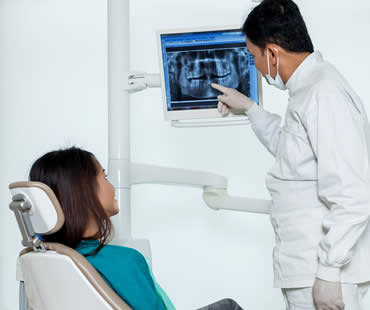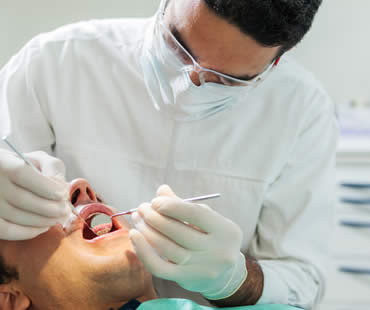
Dec 21, 2023 | Dental Topics 2, General Dentistry, Blog
General dentistry offers exactly what the name implies: dental care related to the general maintenance of good oral health. The ideal way to look at dentistry is preventative, which means focusing on good oral hygiene and functionality before problems can take hold. Finding a qualified and skilled general dentist who you visit every six months for checkups is the best way to prevent serious dental issues and help you maintain excellent oral health.
A trip to the general dentist for you or any of your family members, no matter their age, is a smart way to keep your smile looking and feeling great. Your general dentist will help create the perfect dental plan that depends on your personal oral health and needs. A typical dental visit includes thorough examination, X-rays or other diagnostic tests, professional teeth cleaning, and any treatments that might be needed for your condition. If a certain treatment isn’t available through your general dentist, it’s likely that you’ll receive a referral to a reputable specialist to complete the work.
Every dentist is unique, so you’ll need to inquire about the specific treatments available at your dentist’s practice. Some common services that many general dentists provide include:
- Dental sealants
- Fluoride treatments
- Professional cleanings
- Gum scaling or recontouring
- Fillings
- Bonding
- Root canal therapy
- Crowns and bridges
- Dental implants
- Dentures
- Veneers
- Orthodontics
In addition to dental treatments, your general dentist will evaluate your at-home hygiene routine and make suggestions for improvement. You will learn proper brushing and flossing techniques, as well as learn about any additional products or practices that might improve your oral health. Your general dentist wants you and your family to have the best smiles and oral health possible, and will help you achieve that goal.
Schedule your appointment at our Conyers dental office

Jul 29, 2022 | Dental Topics 2, General Dentistry, Blog
What is a dental bridge?
- Dental bridges make a bridge between two anchor teeth and are meant to fill a space left by a missing tooth. Teeth can be missing due to trauma, decay or some type of natural loss. Dental crowns cap the anchor teeth, giving the bridge stability and giving the replacement tooth the strength to function as a natural tooth.
What is a dental crown?
- Dental crowns are a restorative treatment meant to protect a tooth that has gone bad due to cracking, acute decay, or has received root canal therapy. A crown is crafted to fit in your mouth and to function exactly as your natural tooth would. They work by covering the damaged tooth entirely and can change the shape or alignment of the prior natural tooth.
Isn’t a dental crown the same thing as a dental cap?
- A dental cap and a dental crown are two different terms for the same thing.
What are dental crowns made of?
- Dental crowns can be made of 100% ceramic (porcelain), porcelain-fused-to-metal, or gold or other metal alloy, including zirconia. Metal alloy dental crowns are typically stronger and more suited for back teeth.
Do dental crowns look natural?
- Crowns made from porcelain or ceramic can be very natural looking. Many materials have excellent translucency, and mimic your natural teeth very well.
Is a dental bridge an option for me?
- Are you missing a tooth? Are your adjacent teeth healthy and stable? If so, dental bridge treatment may be right for you.
Are there options available to me other than dental bridges to replace missing teeth?
- The best alternative option to replace a missing tooth is a dental implant. Dental implants can restore one or more teeth by being placed directly into the jawbone, fusing securely over time.
If you’re considering moving forward to replace your missing tooth or teeth, discuss options with your cosmetic dentist. Get the answers you need to determine if dental crowns or dental bridges can help you reach your smile goals.
We treat patients from Conyers and the surrounding area

Feb 26, 2021 | Dental Topics 2, General Dentistry, Blog
Excellent dental care protects not only your oral health but also your general health. You may think brushing and flossing are enough to keep you safe from decay and disease, but routine care and examinations by a good general dentist are also an important and necessary part of taking care of your oral and general health.
A general dentist plays a vital role in identifying and treating minor problems before they become major ones. The primary focus of a general dentist is preventative care. Several essential services provided by a general dentist include:
Detecting and treating potential problems early may mean the difference between losing and saving an infected tooth. Caught early, gingivitis or periodontitis can be stopped and treated before becoming more serious problems.
A general dentist can treat your entire family, from the youngest child to the more senior members. It is your general dentist’s responsibility to oversee the diagnosis, treatment and overall coordination of all your dental health needs. Should you require specialized oral care, your general dentist can work with specialty dentists to ensure you receive the best possible care.
To guarantee the longevity of your oral health, look to a qualified general dentist for excellent dental care. A regular schedule of exams and cleanings by your general dentist
If you need a dentist in Conyers contact us today

Apr 21, 2023 | Dental Topics 2, General Dentistry, Blog
It’s easy to put off a trip to the dentist if you’re not experiencing any pain or noticeable issues. Maybe it’s inconvenient in your busy schedule, maybe you don’t want to spend the money, or maybe you experience anxiety about dental visits. None of these are good enough reasons to forego proper dental care so that you ensure a healthy mouth and attractive smile.
Having regular checkups with your general dentist is important for a variety of reasons. Probably the most beneficial reason is to catch problems early, before they have time to become serious and negatively impact your oral health. Cavities and gum disease are both examples of issues that can wreak havoc in your mouth if left untreated, but if handled quickly they may disappear with as little as a fluoride treatment or change in your hygiene routine. Avoiding treatments like fillings, crowns, or root canals – not to mention the associated costs to your wallet and your schedule – are great reasons to see your dentist every six months!
Another benefit of regular checkups is a brighter, more beautiful smile. Even the best dental hygiene at home can’t reach every bit of plaque or tartar that accumulates on your teeth. Professional cleanings eliminate buildup to give you a more appealing smile, as well as removing harmful and stinky bacteria from your mouth.
Your overall health also reaps the rewards of consistent dental care. Oral problems can impact your general health through things like introducing dangerous bacteria into your body that can spread and cause various health risks. Also, your dentist may notice signs of health issues you might not realize, such as cancers or diseases or nutritional deficiencies.
Make your smile a priority and visit your general dentist regularly. Don’t let excuses get in the way of receiving the rewards dentistry has to offer.
We look forward to seeing you in our Conyers dental office

Mar 12, 2021 | Dental Topics 2, General Dentistry, Blog
Maintaining a healthy, winning smile is easy with the help of general dentistry. People have all kinds of excuses for avoiding dental checkups. Don’t have the time? Advancements in procedures make treatment faster and more efficient, and extended hours allow patients to better fit appointments in their schedules. Too expensive? Many procedures are reasonably priced and most offices offer financial plans. Afraid of the dentist? General dentistry offers options for maintaining patient comfort and minimizing pain.
Once you realize there is no good excuse for skipping dental treatment, you should go for checkups twice a year for optimum care. Prevention is often the key to having the best oral health. Routine checkups identify early warning signs of issues like tooth decay or gum disease, so that problems can be corrected before becoming severe. Thorough examinations, diagnostic tests like X-rays, and regular professional cleanings are all steps to a healthy smile.
General dentists also teach proper hygiene methods so that you can keep your mouth in good shape between checkups. Routine dental care also may prevent harmful bacteria from entering your bloodstream and damaging other parts of your body.
If problems are diagnosed when you visit your dentist, various treatments can be performed to restore your oral health. General dentists treat all kinds of issues and typically offer dental fillings, root canal therapy, extractions, bonding, crowns, dentures and more. If there are procedures that you need that your general dentist doesn’t perform or would prefer you visit a specialist for advanced treatment, you’ll be referred to a qualified and experienced doctor.
General dentistry can make the difference between a dull, damaged, unhealthy smile and one that will look nice and function well for the rest of your life. Don’t hesitate in visiting your dentist regularly for optimum oral health.
Schedule your appointment at our Conyers dental office

Jan 31, 2020 | Dental Topics 2, General Dentistry, Blog
The fact is that the health care provider most people should see the most is their general dentist. Because this branch of healthcare is uniquely targeted at preventing disease and promoting good hygiene, general dentistry can help you avoid oral concerns and maintain a healthy and attractive smile.
General dentists are the most common providers for dental treatment for patients of all ages. Routine dental visits involve examinations, sometimes diagnostic tests, professional cleanings, and discussions about concerns. If your checkup reveals issues that require further treatment, most general dentists perform required procedures. However, your general dentist may refer you to a specialist for complex treatments.
What does a general dentist do? Differing from specialists who focus on a certain area of oral care, general dentists offer a wide variety of services.
- Preventive services – The goal of preventive dentistry is to stop disease before it has a chance to progress. Regular exams, diagnostic images, and professional cleanings are part of prevention. Proper oral hygiene techniques will also be discussed.
- Restorative services – Procedures for dental problems falls into this category, including fillings, crowns, gum disease remedies, dentures and more. Some general dentists also offer specialized treatments like root canal therapy and dental implants.
- Overall oral health services – Some dental problems are reflected in overall health concerns. Diabetes, cardiovascular disease, pregnancy complications and other problems may arise. General dentists can identify issues like these and offer treatment or direct you to the right specialist.
- Cosmetic services – Many general dentists offer cosmetic treatments such as dental veneers, teeth whitening, bonding, orthodontics and more.
When should you visit your general dentist? Experts recommend getting checkups every six months, or more often if you have an issue that should be addressed like a toothache or gum bleeding. Cosmetic appointments can be made at any time. The main thing is seeing your general dentist regularly so you can benefit from preventive care.
We look forward to seeing you in our Conyers dental office








